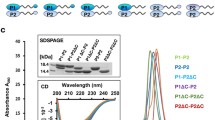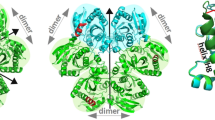Summary
To determine the molecular basis for the temperature-sensitivity of pure rho RNA-dependent ATPase from Escherichia coli mutant rho-115 cells, we investigated mutant rho binding to [3H] polyC as measured by retention on nitrocellulose filters. Complexes of wild-type rho and polyC incubated at 37°C and 45°C were similarly stable. At 37°C mutant rho-polyC binary complexes were inactivated at a slightly faster rate than complexes with wild-type rho. Upon shift to 45°C the quantity of rho-115 bound to polyC declined immediately, resulting in one-fifth of the quantity of complexes observed at 37°C. Shift back to 37°C restored the level of observed complexes by two-fold. The inclusion of ATP or the analogue β-γ methylene ATP during 45°C incubation resulted in stable mutant rho-polyC complexes. The hydrolysis product ADP was also effective in stabilizing binary complexes at 45°C but this effect was observed with an order of magnitude more ADP than ATP. Adenine, adenosine, AMP or Pi had no stabilizing effect. We conclude that the mutant rho-115 protein exhibits a structural instability as a result of binding RNA. Furthermore ATP confers a wild-type phenotype upon rho-115 protein, probably as a result of conformational change due to binding of this compound. The effect of ATP on the stability of mutant rho-polyC binary complexes supports the model of ATP modulation of rho-RNA interaction proposed by Galluppi and Richardson (1980).
Similar content being viewed by others
References
Adhya S, Sarkar P, Valenzuela D, Maitra U (1979) Termination of transcription by Escherichia coli RNA polymerase: Influence of secondary structure of RNA transcripts on p-independent and p-dependent termination. Proc Natl Acad Sci USA 76:1613–1617
Beckwith J (1963) Restoration of operon activity by suppressors. Biochim Biophys Acta 76:162–164
Bektesh SL, Richardson JP (1980) A p-recognition site on phage λ cro-gene mRNA. Nature 283:102–104
Carter T, Newton A (1971) New polarity suppressors in Escherichia coli: Suppression and messenger RNA stability. Proc Natl Acad Sci USA 68:2962–2966
Darlix J-L (1973) The functions of rho in T7-DNA transcription in vitro. Eur J Biochem 35:517–526
Das A, Court D, Adhya S (1976) Isolation and characterization of conditional lethal mutants of Escherichia coli defective in transcription termination factor rho. Proc Natl Acad Sci USA 73:1959–1963
Das A, Merril C, Adhya S (1978) Interaction of RNA polymerase and rho in transcription termination: Coupled ATPase. Proc Natl Acad Sci USA 75:4828–4832
Galluppi GR, Richardson JP (1980) ATP-induced changes in the binding of RNA synthesis termination protein rho to RNA. J Mol Biol 138:513–539
Guarente LP, Mitchell DH, Beckwith J (1977) Transcription termination at the end of the tryptophan operon of Escherichia coli. J Mol Biol 112:423–436
Guterman SK, Howitt CL (1979) Rifampicin supersensitivity of rho strains of E. coli, and suppression by sur mutation. Mol Gen Genet 169:27–34
Housley PR, Whitfield HJ (1982) Transcription termination factor p from wild type and p−111 strains of Salmonella typhimurium. J Biol Chem 257:2569–2577
Inoko H, Imai M (1976) Isolation and genetic characterization of the nit A mutants of Escherichia coli affecting the termination factor rho. Mol Gen Genet 143:211–221
Inoko H, Shigesada K, Imai M (1977) Isolation and characterization of conditional-lethal rho mutants of Escherichia coli. Proc Natl Acad Sci USA 74:1162–1166
Kent RB, Guterman SK (1981) A mutant rho ATPase from Escherichia coli that is temperature-sensitive in the presence of RNA. Mol Gen Genet 181:367–372
Klee CB, Singer MF (1967) A convenient method for the preparation of primer-dependent polynucleotide phosphorylase from Micrococcus lysodeikticus. Biochem Biophys Res Commun 29:356–361
Korn LJ, Yanofsky C (1976) Polarity suppressors increase expression of the wild-type tryptophan operon of Escherichia coli. J Mol Biol 103:395–409
Lowery-Goldhammer C, Richardson JP (1974) An RNA-dependent nucleoside triphosphate phosphohydrolase (ATPase) associated with rho termination factor. Proc Natl Acad Sci USA 71:2003–2007
Malamy M (1966) Frameshift mutations in the lactose operon of E. coli. Cold Spring Harbor Symp Quant Biol 31:189–201
Morse DE, Guertin M (1972) Amber suA mutations which relieve polarity. J Mol Biol 63:605–608
Ratner D (1976) Evidence that mutations in the suA polarity suppressing gene directly affect termination factor rho. Nature 259:151–153
Richardson JP, Grimley C, Lowery C (1975) Transcription termination factor rho activity is altered in Escherichia coli with suA gene mutations. Proc Natl Acad Sci USA 72:1725–1728
Richardson JP, Macy M (1981) Ribonucleic acid synthesis termination protein p function: Effects of conditions that destabilize ribonucleic acid secondary structure. Biochemistry 20:1133–1139
Richardson JP, Carey JL III (1982) Rho factors from polarity suppressor mutants with defects in their RNA interactions. J Biol Chem 257:5767–5771
Shigesada K, Imai M (1978) Studies on the altered rho factor in nitA mutants of Escherichia coli defective in transcription termination. II. Purification and molecular properties of the mutant rho. J Mol Biol 120:467–486
Author information
Authors and Affiliations
Additional information
Communicated by E. Bautz
Rights and permissions
About this article
Cite this article
Kent, R.B., Guterman, S.K. Temperature-sensitive mutant rho-115 rho-RNA binary complexes, and stabilization by substrates and analogues. Molec Gen Genet 187, 330–334 (1982). https://doi.org/10.1007/BF00331139
Received:
Issue Date:
DOI: https://doi.org/10.1007/BF00331139




